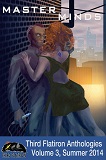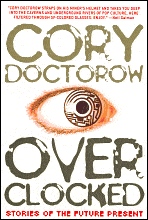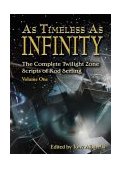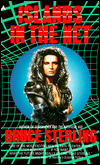
Master Minds, edited by Julianna Rew
Book Review by Jeremy D. Carr
Have you read this book?
From Third Flatiron Anthologies comes another collection of short fiction looking deep into the human condition. For this collection, editor Julianna Rew and her staff asked for stories on the theme of intelligence, and the response from the contributing writers was certainly profound. The thirteen stories chosen for inclusion in this anthology all take a unique look at the concept of intelligence. From the lines between artificial intelligence and sentience, to the intelligence of other species, to how other species may view our own so-called intelligence, these stories will challenge the reader to define their own perspectives of what intelligence is to us. Although the theme remains the same, the styles of these stories range from philosophical to frightening, comical to conniving, promising that this collection will entertain, and possibly enlighten, any curious sci-fi reader. Here is a glimpse of what you will find in this collection, if you are intelligent enough to want to read it that is.
"The Abstract Heart" by Martin Clark -- The more things change the more they stay the same. In a future where man has created technology equal to himself a man still falls for the wrong woman, an evil one without a body of her own.
"Oi, Robot" by Konstantine Paradias -- The easy part about being a hyper-intelligent AI singularity that becomes sentient is discovering all the secrets of the universe. The hard part is getting the humans who unwittingly created you to acknowledge your sentience without destroying them. Ahh, silly humans!
"I Scream Man" by William Huggins -- It is an old story, the nature of man, but to those who do not know of us the story is one of confusion and needless loss. When met with other intelligent life in the universe, will we be able to put aside our tendency for destruction? Probably not.
"The Frankenstein Project" by Ellen Denton -- Without life there would be no death. Would that work the other way around? This story is a profound look at that question.
"Survival" by Jason Lairamore -- When an immortal being is faced with mortality it learns a lesson all mortal creatures already know, that of survival.
"Broken Toys in a Big Backyard" by Vince Liberato -- When the machinations of man go to war against their creators, then man must become more like their machines to survive. It is a vicious cycle, and a battle that has no end... and no winner.
"Hacking 'Wilkes-Barre PA, May 2001'" by NM Whitley -- Man has created so many "smart" technologies. What will happen to them when we are gone? Will they evolve? Will your online persona develop its own personality? And if it does, what will it think of its creator?
"The Cabin" by Lela E. Buis -- Throughout civilization Dog has been Man's best friend. But, when Man's civilization collapses and Man reverts to his own animalism, that friendship is lost. This is a story of how sometimes the love between Man and Dog can persevere through the most extreme circumstances.
"In Mrs. Timmet's Class" by Patrick McCarty -- Reality is a matter of perception. An artificial intelligence that does not know it is artificial is as real as any other. At least it believes itself to be so, and if something can believe something, real or not, must it not be real? It is what it perceives.
"Watching the Skies" by Robin Wyatt Dunn -- God creates Man. Man creates God. God abandons Man. Man struggles to recreate himself.
"Music of the Mind" by Cherith Baldry -- The most difficult enemy to fight is one you do not understand. The difference between life and death can be decided by how far you are willing to go to learn what you need to know.
"The Right Books" by Elliotte Rusty Harold -- Censorship is a limitation of thought, but when the uncensorable, unlimited data source starts thinking for itself, it may start censoring those who kept it from being censored. It is a vicious cycle that shows how dangerous truly free access to all information can be.
"Schadenfreude" by Russell Nichols -- What is the key to human happiness? Why do we so often react negatively to the positive and vice versa? In this warning from the future, we learn about our happiness from our technological legacy. And, as usual, the truth may frighten you.
"The Abstract Heart" by Martin Clark -- The more things change the more they stay the same. In a future where man has created technology equal to himself a man still falls for the wrong woman, an evil one without a body of her own.
"Oi, Robot" by Konstantine Paradias -- The easy part about being a hyper-intelligent AI singularity that becomes sentient is discovering all the secrets of the universe. The hard part is getting the humans who unwittingly created you to acknowledge your sentience without destroying them. Ahh, silly humans!
"I Scream Man" by William Huggins -- It is an old story, the nature of man, but to those who do not know of us the story is one of confusion and needless loss. When met with other intelligent life in the universe, will we be able to put aside our tendency for destruction? Probably not.
"The Frankenstein Project" by Ellen Denton -- Without life there would be no death. Would that work the other way around? This story is a profound look at that question.
"Survival" by Jason Lairamore -- When an immortal being is faced with mortality it learns a lesson all mortal creatures already know, that of survival.
"Broken Toys in a Big Backyard" by Vince Liberato -- When the machinations of man go to war against their creators, then man must become more like their machines to survive. It is a vicious cycle, and a battle that has no end... and no winner.
"Hacking 'Wilkes-Barre PA, May 2001'" by NM Whitley -- Man has created so many "smart" technologies. What will happen to them when we are gone? Will they evolve? Will your online persona develop its own personality? And if it does, what will it think of its creator?
"The Cabin" by Lela E. Buis -- Throughout civilization Dog has been Man's best friend. But, when Man's civilization collapses and Man reverts to his own animalism, that friendship is lost. This is a story of how sometimes the love between Man and Dog can persevere through the most extreme circumstances.
"In Mrs. Timmet's Class" by Patrick McCarty -- Reality is a matter of perception. An artificial intelligence that does not know it is artificial is as real as any other. At least it believes itself to be so, and if something can believe something, real or not, must it not be real? It is what it perceives.
"Watching the Skies" by Robin Wyatt Dunn -- God creates Man. Man creates God. God abandons Man. Man struggles to recreate himself.
"Music of the Mind" by Cherith Baldry -- The most difficult enemy to fight is one you do not understand. The difference between life and death can be decided by how far you are willing to go to learn what you need to know.
"The Right Books" by Elliotte Rusty Harold -- Censorship is a limitation of thought, but when the uncensorable, unlimited data source starts thinking for itself, it may start censoring those who kept it from being censored. It is a vicious cycle that shows how dangerous truly free access to all information can be.
"Schadenfreude" by Russell Nichols -- What is the key to human happiness? Why do we so often react negatively to the positive and vice versa? In this warning from the future, we learn about our happiness from our technological legacy. And, as usual, the truth may frighten you.
|
Click here to buy Master Minds, edited by Julianna Rew on Amazon
|
Master Minds, edited by Julianna Rew on Amazon

| More Books You Might Like |
Comment on Master Minds, edited by Julianna Rew
| Comments on Master Minds, edited by Julianna Rew |
| There are no comments on this book. |




